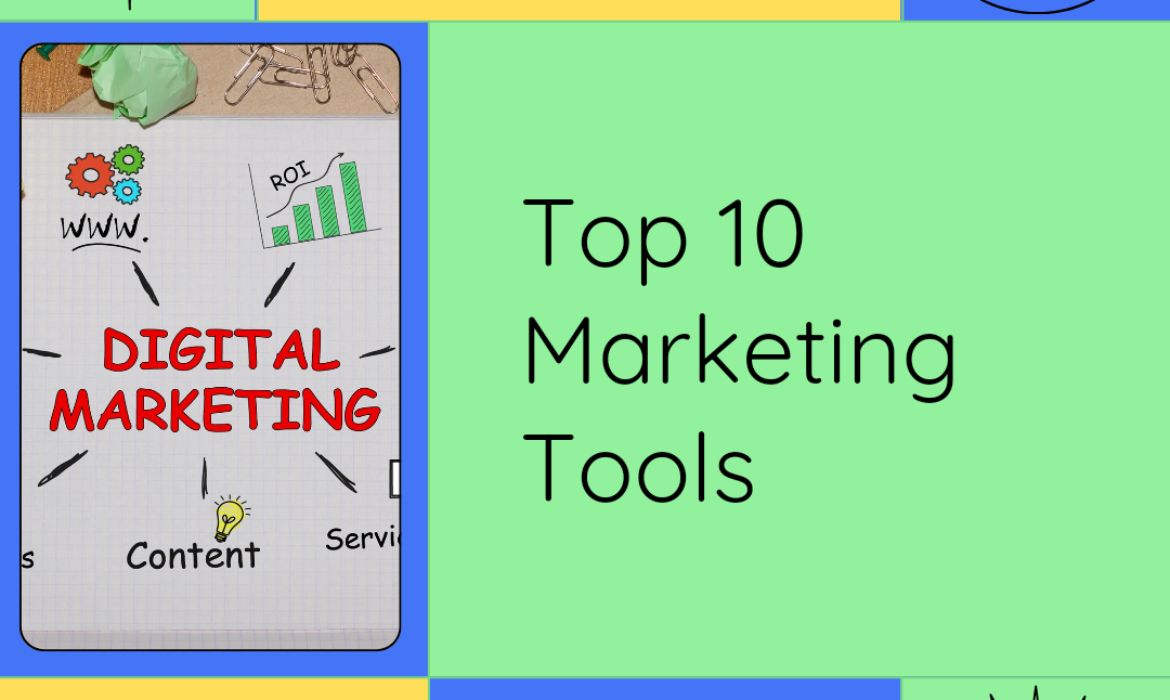081-4797-7173
Running a business today is a lot different from what it was even a few years ago. Entrepreneurs now need more than just a great idea and hard work.
They need to know how to make their voices heard in the crowded online space. Digital marketing is an essential piece of the puzzle for any business looking to grow and stay relevant.
For an entrepreneur, the right digital marketing tools can be game changers, enabling you to work smarter, not harder. They can simplify your SEO strategy, streamline your content creation, automate your social media, and make email marketing very easy.
In this guide, we will review the top 10 digital marketing tools every entrepreneur should know about. We’ll talk about what each tool does and why it’s useful. We will also look at how you can integrate it into your day-to-day operations.
SEO and Keyword Research Tools
One of the first steps in building a strong digital presence is getting your content seen by the right people. This is where SEO (Search Engine Optimization) and keyword research come in. The right tools can guide you in choosing the best keywords. In essence, understanding what your audience is searching for, and beating your competitors. Here are top tools for SEO and keyword research:
Tool 1: SEMrush/Ahrefs
If you’re looking to build a strong SEO strategy, you can’t ignore SEMrush or Ahrefs. These tools have become industry leaders for a reason: they offer a wealth of information that helps you make smarter marketing decisions.
Features and Benefits:
- Keyword Research: With these tools, you get detailed insights like search volume, keyword difficulty, and related keywords to ensure your content is relevant and competitive.
- Competitor Analysis: SEMrush and Ahrefs can show you the keywords they’re ranking for, their backlink profiles, and even their top-performing content.
- Site Audits: Keeping your site optimised is just as important as picking the right keywords. Both tools can run site audits to spot technical issues that might be holding your site back.
The beauty of SEMrush and Ahrefs is that they take the guesswork out of SEO. Instead of wasting time trying to figure out why your traffic isn’t growing, you get actionable insights. This means you can focus more on creating content and less on troubleshooting.
Tool 2: Google Keyword Planner
Google Keyword Planner is a reliable starting point for keyword research, especially if you’re on a budget.
Features and Benefits:
- Discovering Keywords: With this tool, all you have to do is put in words related to your business and Google Keyword Planner will return a list of related keywords, complete with data on search volume and competition. This helps you decide which terms are worth targeting.
- Planning PPC Campaigns: This tool also helps you estimate bid costs and forecasts for ad campaigns, making it a two-in-one option for entrepreneurs dabbling in both SEO and paid search.
It’s free, easy to use, and backed by Google’s massive search data. For entrepreneurs who are just starting out or those who want to supplement their main SEO tool, Google Keyword Planner is a solid choice. Additionally, it is integrated with Google Ads, so it’s perfect for pairing organic and paid ad strategies.
Content Creation and Management Tools
Creating high-quality content is at the heart of any successful digital marketing strategy. As an entrepreneur, you need tools that make content creation easier, more efficient, and visually appealing without requiring a steep learning curve. Here are two standout tools that can transform your content creation process:
Tool 3: Canva
Gone are the days when you needed to hire a graphic designer for every small design task. Canva has made it easier by providing users with an easy-to-use platform that makes professional design accessible. Its drag-and-drop interface allows you to create everything from social media graphics and presentations to infographics and email templates without breaking a sweat.
Features and Benefits:
- Templates Galore: Canva offers thousands of customizable templates that fit a variety of business needs, from social media posts to blog graphics. These templates make it simple to maintain a consistent brand look.
- User-Friendly Interface: Even if you’re not tech-savvy, Canva’s intuitive layout makes it easy to create visually stunning content.
- Collaboration Tools: Working with a team? Canva’s collaboration feature allows you to share projects and work on designs together in real time.
Instead of stressing over design or paying a designer to create graphic content for you, Canva lets you create an eye-catching design in minutes. The best part is that this comes at little or no cost at all.
Tool 4: Grammarly/QuillBot
When it comes to written content, nothing turns readers away faster than poorly written or edited text. Whether you’re writing a blog post, email campaigns, or working on social media captions, having a reliable writing assistant can make a difference.
You don’t need to be a professional writer to communicate clearly, but your writing should still be polished and error-free. Grammarly and QuillBot are tools that can help you refine your writing, making it more engaging and professional.
Features and Benefits:
- Real-Time Proofreading (Grammarly): Grammarly catches grammar mistakes, typos, and awkward phrasing as you type, ensuring that your content is clear and professional.
- Paraphrasing and Content Rewriting (QuillBot): If you struggle with finding the right way to phrase written content, QuillBot offers AI-powered suggestions to help you paraphrase sentences while maintaining your intended meaning.
- Tone Adjustment: Both tools can help you change the tone of your writing to match your brand voice.
Grammarly steps in to highlight potential issues, suggest edits, and ensure your post reads smoothly. QuillBot can assist when you’re stuck rephrasing or need to add variety to your language. With these tools, you can focus more on the ideas you want to share and less on editing and proofreading.
Social Media Management Tools
Social media has become a vital platform for businesses to engage with their audience and promote products or services. However, managing multiple accounts and keeping up with daily posting can be a major time waster for busy entrepreneurs. That’s where social media management tools come in. Here are top tools that make the process simpler and more efficient:
Tool 5: Hootsuite/Buffer
Managing social media accounts can feel like a full-time job. Between posting, scheduling, and tracking engagement, it’s easy to get overwhelmed. Hootsuite and Buffer are lifesavers for entrepreneurs who want to keep their social media game strong without spending all day on it. These tools allow you to schedule posts in advance and also monitor different social media accounts from a single dashboard. You can also analyse your content’s performance.
Features and Benefits:
- Content Scheduling: Both Hootsuite and Buffer let you plan and schedule posts across platforms like Instagram, Twitter, LinkedIn, and Facebook. This means you can create batches for content for the week or even the month and set it to post automatically.
- Engagement Tracking: This feature lets you know how your audience is interacting with your content. These tools provide insights into likes, shares, comments, and overall engagement, helping you see what’s working and what needs tweaking.
- Ease of Use: Both platforms are user-friendly and designed for entrepreneurs who may not have a dedicated social media team. The straightforward interfaces make it easy to jump in and start scheduling right away.
The last thing you want to do is stop everything just to post on social media. With Hootsuite or Buffer, you can set up a week’s worth of posts on Sunday night and not think about it again until the following week.
Tool 6: Sprout Social
For entrepreneurs who want more features and deeper analytics, Sprout Social is a step up. While it comes with a higher price tag, it offers more comprehensive capabilities that can really elevate your social media strategy.
Features and Benefits:
- Detailed Analytics: Sprout Social doesn’t just tell you how many likes a post received; it gives you information about audience demographics, engagement patterns, and post performance over time.
- Smart Inbox: This feature brings all your social media messages into one unified inbox, so you never miss an important message from your customers.
- Collaboration Tools: If you work with a team or plan to outsource some of your social media work, Sprout Social’s collaboration features make it easy to assign tasks and manage workflows.
Email Marketing Tools
Email marketing remains one of the most powerful and cost-effective ways to engage your audience and drive sales. Whether you’re nurturing leads, sending out newsletters, or running promotions, the right email marketing tool can streamline your campaigns and help you achieve better results. Here are two top email marketing tools every entrepreneur should know about:
Tool 7: Mailchimp
Mailchimp is known for its intuitive interface and features. It’s a go-to for entrepreneurs who want to start building their email lists and running campaigns without feeling overwhelmed. Mailchimp offers an all-in-one platform where you can design, send, and analyse email campaigns, even if you’re just starting out or running a small operation.
Features and Benefits:
- Drag-and-Drop Editor: Creating visually appealing emails is simple with Mailchimp’s drag-and-drop editor. No coding skills required, just a creative eye.
- Automated Campaigns: From welcome emails to cart abandonment reminders, Mailchimp’s automation tools save time by sending targeted messages based on user actions.
- Audience Segmentation: Entrepreneurs can segment their audience based on behaviour, demographics, or past interactions to ensure the right messages go to the right people.
- Analytics and Reporting: Mailchimp provides data on open rates, click-through rates, and campaign performance, allowing you to tweak your strategy as needed.
Tool 8: Constant Contact
This tool is particularly beneficial for entrepreneurs looking to scale their email marketing efforts as their business grows. Constant Contact not only offers email marketing but also tools for social media posting, surveys, and event management, making it a versatile option for growing businesses.
Features and Benefits:
- Email Templates: Choose from a wide range of templates that can be customised to fit your brand’s voice and aesthetic.
- Event Marketing Tools: If your business involves hosting webinars or events, Constant Contact’s event management tools let you promote and also manage registrations directly through the platform.
- Integrations: The tool integrates with e-commerce platforms like Shopify, allowing you to track sales as well as customer behaviour.
- Customer Support: Constant Contact offers real-time support, which is great for entrepreneurs who might need extra guidance when troubleshooting or trying out new features.
With Constant Contact, you can send invitations, reminders, and follow-up emails, all these while tracking registrations and engagement. The tool’s versatility can simplify what would otherwise be a complex process.
Analytics and Reporting Tools
Understanding how your marketing efforts are performing is important for making decisions and optimising your strategy. Entrepreneurs need tools that provide clear insights without requiring a background in data science or analytics. Here are two essential analytics tools to keep you ahead of the game:
Tool 9: Google Analytics
Google Analytics is the gold standard when it comes to tracking website traffic and understanding user behaviour. For a free tool, Google Analytics offers an incredible range of insights that help entrepreneurs identify what’s working and what isn’t.
Features and Benefits:
- Website Traffic Analysis: Track how many people visit your site, which pages they view, and how long they stay. This data can help you pinpoint popular content and pages that may need improvement.
- Audience Insights: Get demographic information about your visitors, such as age, gender, and location. This helps you better understand your target audience and tailor your content accordingly.
- User Behaviour: See how users interact with your site; where they click, what they skip, and when they drop off. This can guide improvements in site design and content layout.
- Goal Setting and Tracking: You can set up goals to measure specific actions, like signing up for a newsletter or completing a purchase, and track conversion rates.
Google Analytics can show you how many users visited, where they came from, and what actions they took. This information also helps you to tweak your marketing strategy or make changes to the page to increase conversions.
Tool 10: HubSpot
HubSpot is also a powerful analytics tool that offers in-depth reporting across various aspects of your marketing efforts. For entrepreneurs wanting a more comprehensive overview, HubSpot provides an integration of data from multiple channels.
Features and Benefits:
- All-in-One Dashboard: HubSpot combines analytics for social media, emails, and website performance into one dashboard, making it easy to get a complete picture of your marketing efforts.
- Detailed Reporting: The tool provides customizable reports that help you monitor metrics like open rates, click-through rates, conversion rates, and ROI.
- Lead Tracking: You can track how leads interact with your website and marketing campaigns, giving you valuable insight into their behaviour and needs.
- Marketing Automation: HubSpot allows you to automate follow-ups and trigger responses based on user actions, making it easier to engage leads at the right time.
For instance, if your business just launched an email campaign tied to a webinar. HubSpot can show you how many people opened the emails, clicked on the registration link, and ultimately attended. In addition, this level of detail helps you see what parts of your strategy are driving engagement and what needs adjustment, ensuring that your marketing is always optimised for the best possible results.
Conclusion
The true value of these tools lies not just in their individual capabilities, but in how they can work together to create a seamless and effective marketing strategy. Whether you’re building brand awareness, generating leads, or making data-driven decisions, investing time to understand and implement these digital marketing tools will pay dividends for your business growth. Let us know in the comments which of these tools you will love to try out.
0






